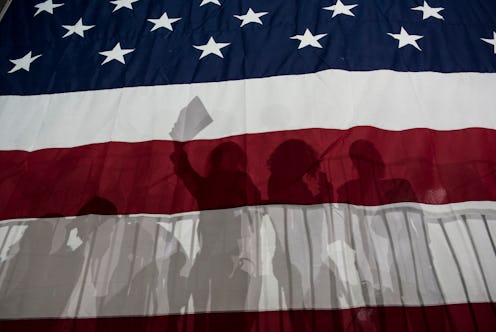News
These Are The Primaries After Washington
On Tuesday, May 24, Washington state voted in its GOP primary, with just one candidate remaining in the race. In Washington state's primary, there were 44 delegates available, and many of them went to presumptive GOP nominee Donald Trump. Trump won at least 27 delegates, which moved him closer to the 1,237 delegates necessary to clinch the GOP nomination, and it's clearer than ever that he will be running for president in the general election. With the Evergreen State's Republican contest now behind us, what primary comes after Washington?
There are just a few primaries left. The next big day for GOP voters, June 7, is also the last day for Republican voters to cast a ballot in the five remaining states: California, Montana, New Jersey, New Mexico, and South Dakota. These states hold a combined 303 bound delegates to be won and allocated on that day, allowing Trump to easily secure the nomination. California alone holds 172 delegates, and Trump needs less than 45, so he's probably set.
After the primaries are over, the GOP will hold their convention from July 18 to 21 in Cleveland, Ohio. However, Trump will likely no longer need to fight for his place after garnering support from other Republican politicians since Texas Sen. Ted Cruz and Ohio Gov. John Kasich dropped out of the race.
For the Democrats, there are seven remaining primaries for voters to voice their opinions. The next Democratic primaries will also be held on June 7; people will have a chance to vote in North Dakota, California, Montana, New Jersey, New Mexico, and South Dakota. The final primary will be in Washington, D.C. on June 14. These states hold a combined 694 delegates and an additional 20 delegates in D.C.
The remaining contests will be especially important for the Democratic candidates, as frontrunner Hillary Clinton holds a wide enough lead over Vermont Sen. Bernie Sanders to clinch the nomination very soon. Clinton currently holds 1,768 total pledged delegates, and Sanders holds 1,497 delegates, so a win for Sanders isn't completely unlikely, but it will be a tough fight — though he's made it clear throughout the campaign cycle that he is OK with that.
Democratic candidates need a total 2,383 delegates to secure the nomination ahead of their July convention in Philadelphia. That puts Clinton at an advantage since she needs 615 more, while Sanders needs 886 more delegates to win the nomination. Based on the 714 delegates that remain, there's a slight chance that neither candidate will clinch the nomination — at least not so easily, especially if they split the remaining wins closely. Even so, FiveThirtyEight has predicted that Clinton will take the nomination in New Jersey.
All we can do now is wait and see how America votes.
